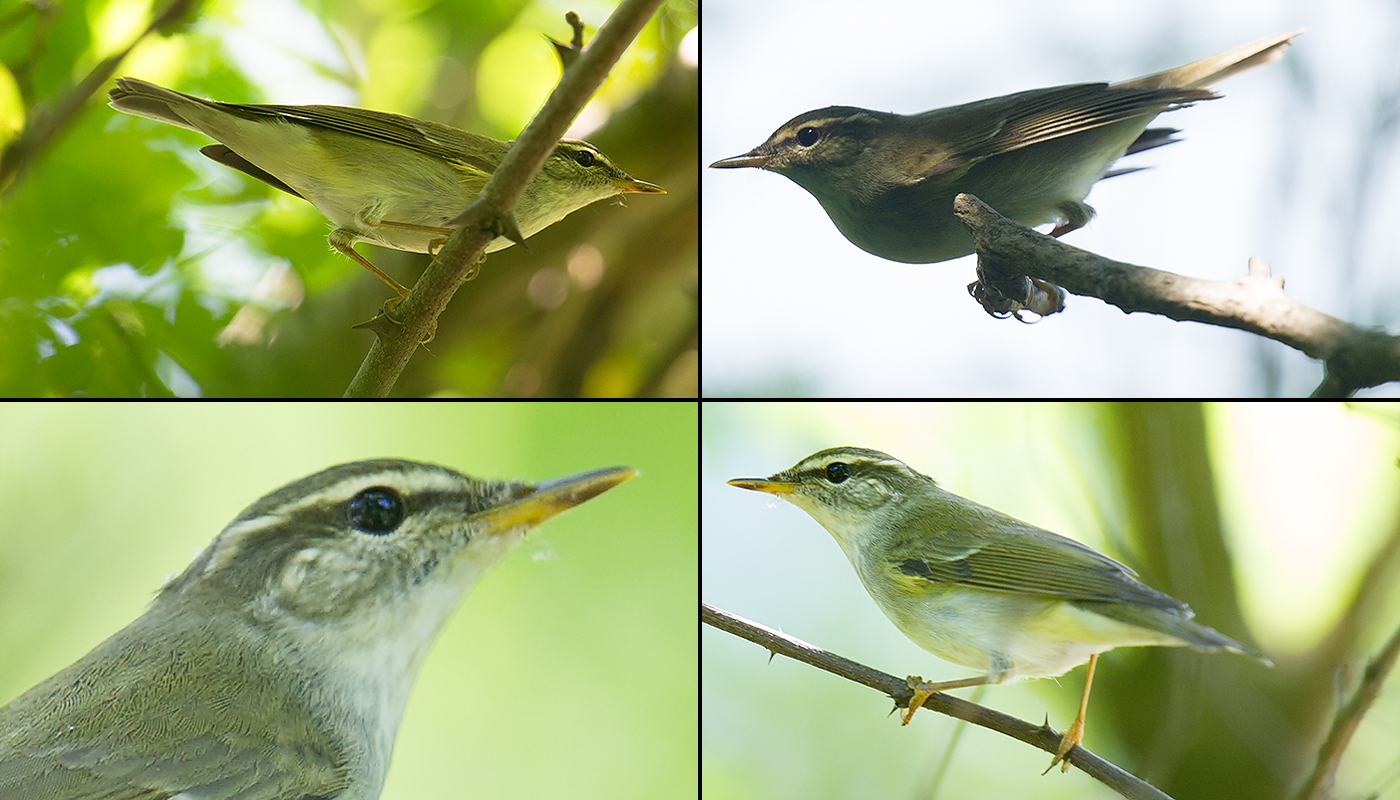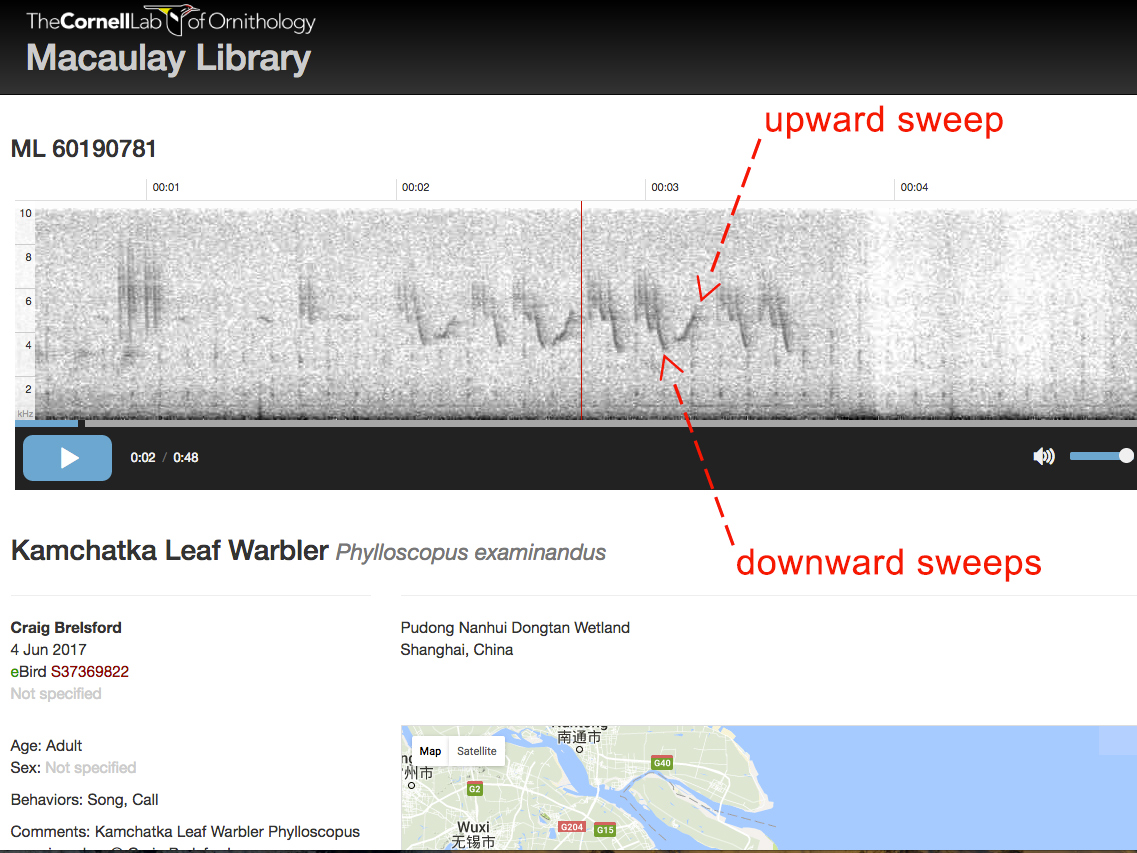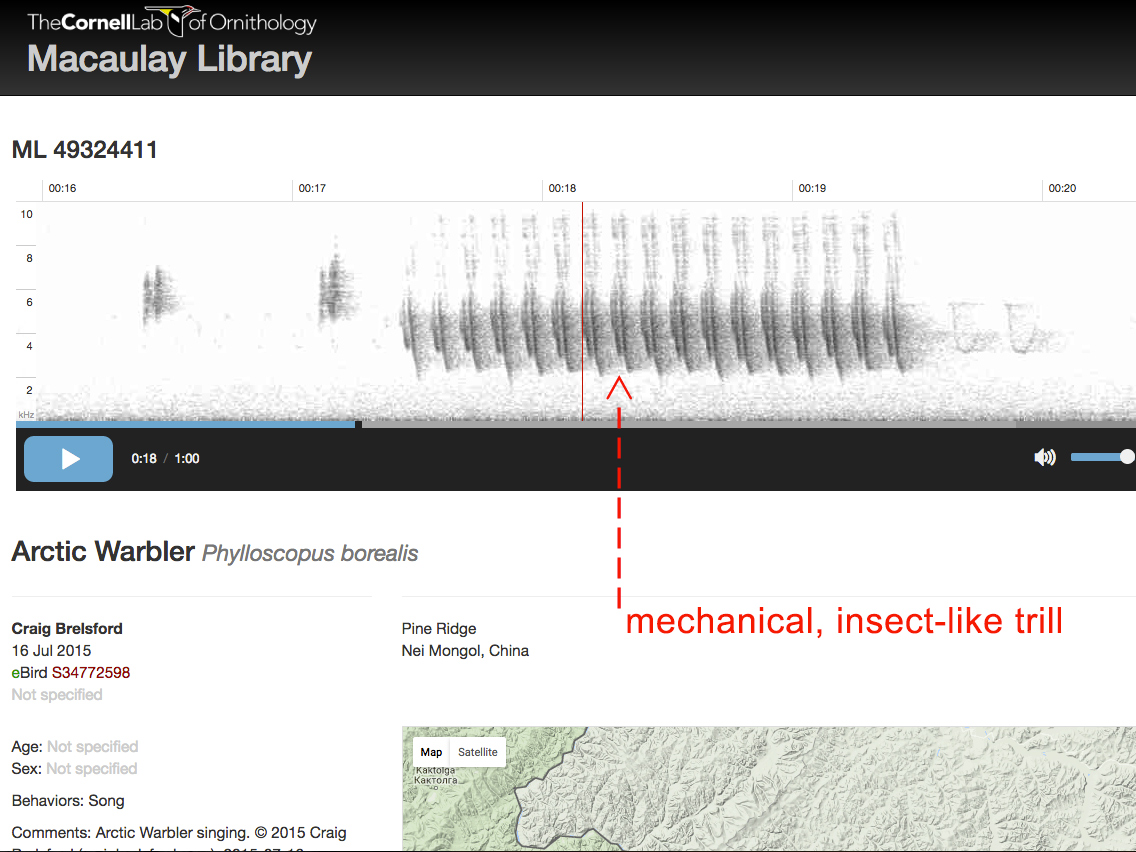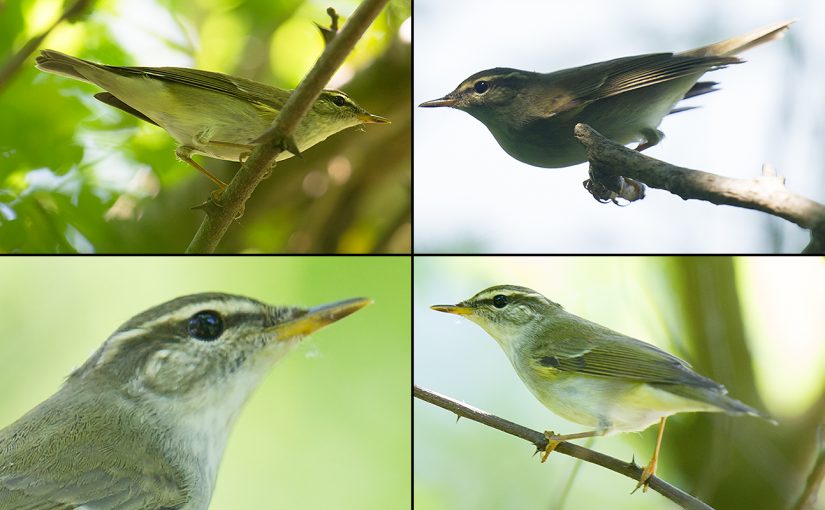by Craig Brelsford
Founder, shanghaibirding.com
Seen at Pudong’s Cape Nanhui on 4 June: Kamchatka Leaf Warbler Phylloscopus examinandus. Veteran British birder Michael Grunwell and I found our 4 Kamchatkas in Microforest 4 (30.953225, 121.959083), the largest of the tree plantations on the landward side of the sea wall. The species is an all-time first for the Shanghai eBird list.
Just after sunrise, Michael and I, as is our wont, were doing “drive-by birding”—creeping along the edge of the road, listening out for birds. Suddenly, I heard an unfamiliar sound.
My gut said, “Hard, loud—Taiga Flycatcher?”
Taiga was not even close, of course. Note, however, what my gut was not saying: “Arctic Warbler,” a bird whose call I know well. This call was decidedly not an Arctic’s, though it soon dawned on us that we were hearing some type of leaf warbler.
To see why my gut did not say Arctic, compare my recordings of the tight tzit call of Arctic Warbler with the looser call of Kamchatka Leaf Warbler:
Arctic Warbler Phylloscopus borealis, Jiangsu (32.560095, 121.041956), China, May (00:09; 1.9 MB; Craig Brelsford)
Kamchatka Leaf Warbler P. examinandus, Microforest 4 (30.953225, 121.959083), Cape Nanhui, Shanghai, 4 June (00:25; 4.9 MB; Craig Brelsford)
Michael and I skidded to a stop and poked our heads into the green tangle of locust trees. The call was being followed by a song. Only upon hearing the song did I think of Arctic Warbler. But here too, the song, though similar, was distinctive—wavier than the straight trill of Arctic. Look at the spectrograms below.
The spectrogram above is of my recording 4 June of Kamchatka Leaf Warbler. Note the pattern: downward sweeps followed by an upward sweep. No one would liken that song to an insect’s. Below, the spectrogram of my recording of the song of Arctic Warbler. Note the straight, cricket-like trill.
Here are the recordings whose spectrograms are shown above:
Arctic Warbler, Yikesama National Forest, Inner Mongolia (52.150833, 121.465639), China, July (01:00; 3.2 MB; Craig Brelsford)
Kamchatka Leaf Warbler, Microforest 4 (30.953225, 121.959083), Cape Nanhui, 4 June (00:48; 9.3 MB; Craig Brelsford)
After hearing several song-call cycles, Michael, my more experienced partner, first said the words “Kamchatka Leaf Warbler.”
Michael has birded the Indonesian islands of Flores and Komodo, where Kamchatka Leaf Warbler winters. Michael said that, last winter, walking through the forests there, he heard dozens of times the call of P. examinandus.
“I know that call,” Michael said.
I whipped out my Olympus DM-650 voice recorder and recorded the calling and singing warbler. Meanwhile, we caught our first glimpse of the individual. It was clearly an “Arctic-type” leaf warbler.
What is an “Arctic-type” leaf warbler? An Arctic-type leaf warbler is a member of one of four closely related taxa divided among three species: Japanese Leaf Warbler Phylloscopus xanthodryas, Kamchatka Leaf Warbler P. examinandus, and Arctic Warbler P. borealis borealis and P. b. kennicotti.
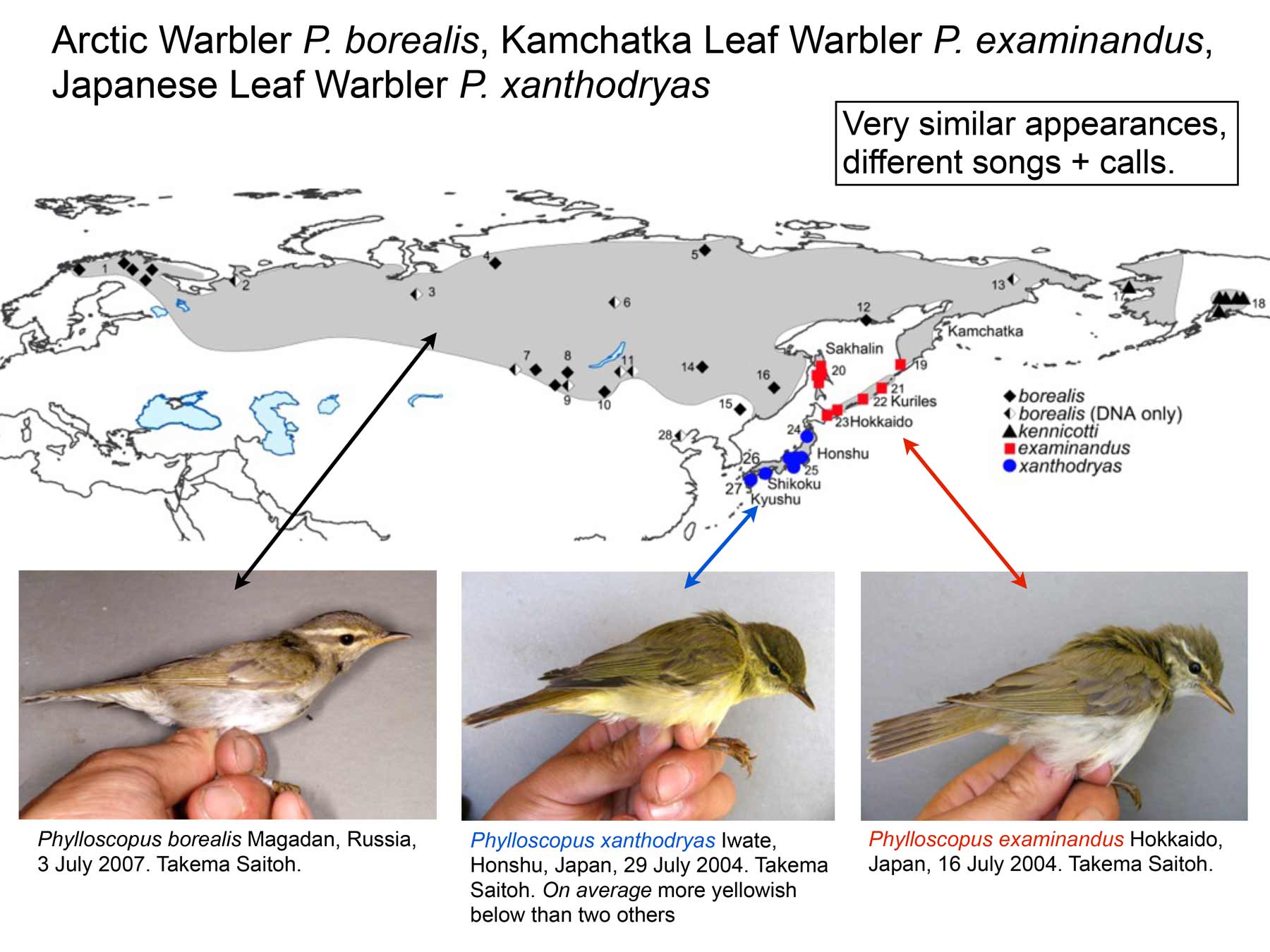
Arctic Warbler is by far the most widespread breeder in the complex. P. b. borealis breeds across northern Eurasia, from Scandinavia to northeast China and the Russian Far East. P. b. kennicotti breeds in western Alaska.
As their names suggest, Japanese Leaf Warbler breeds mainly in Japan (Honshu, Shikoku, Kyushu), Kamchatka Leaf Warbler mainly in the southern Kamchatka Peninsula (as well as on Hokkaido and Sakhalin and in the Kuril Islands).
In 2010 Shanghai Birding member Per Alström et al. proposed the current way of viewing the Arctic-type warblers. Previously, the taxon examinandus was putative, not even reaching the subspecies level; Alström and his team showed that examinandus, with its distinctive song and call, merits recognition not as a subspecies of Arctic Warbler but as a species in its own right.
Of the three Arctic-type species, Japanese Leaf Warbler most stands out, being on average yellower than the two others. Arctic and Kamchatka look much more alike.
There are, however, some slight differences. Kamchatka is said to have a “marginally longer bill, tarsi and tail” than Arctic (del Hoyo & Collar). Sure enough, the Kamchatka I photographed is long-billed. Take a look below.
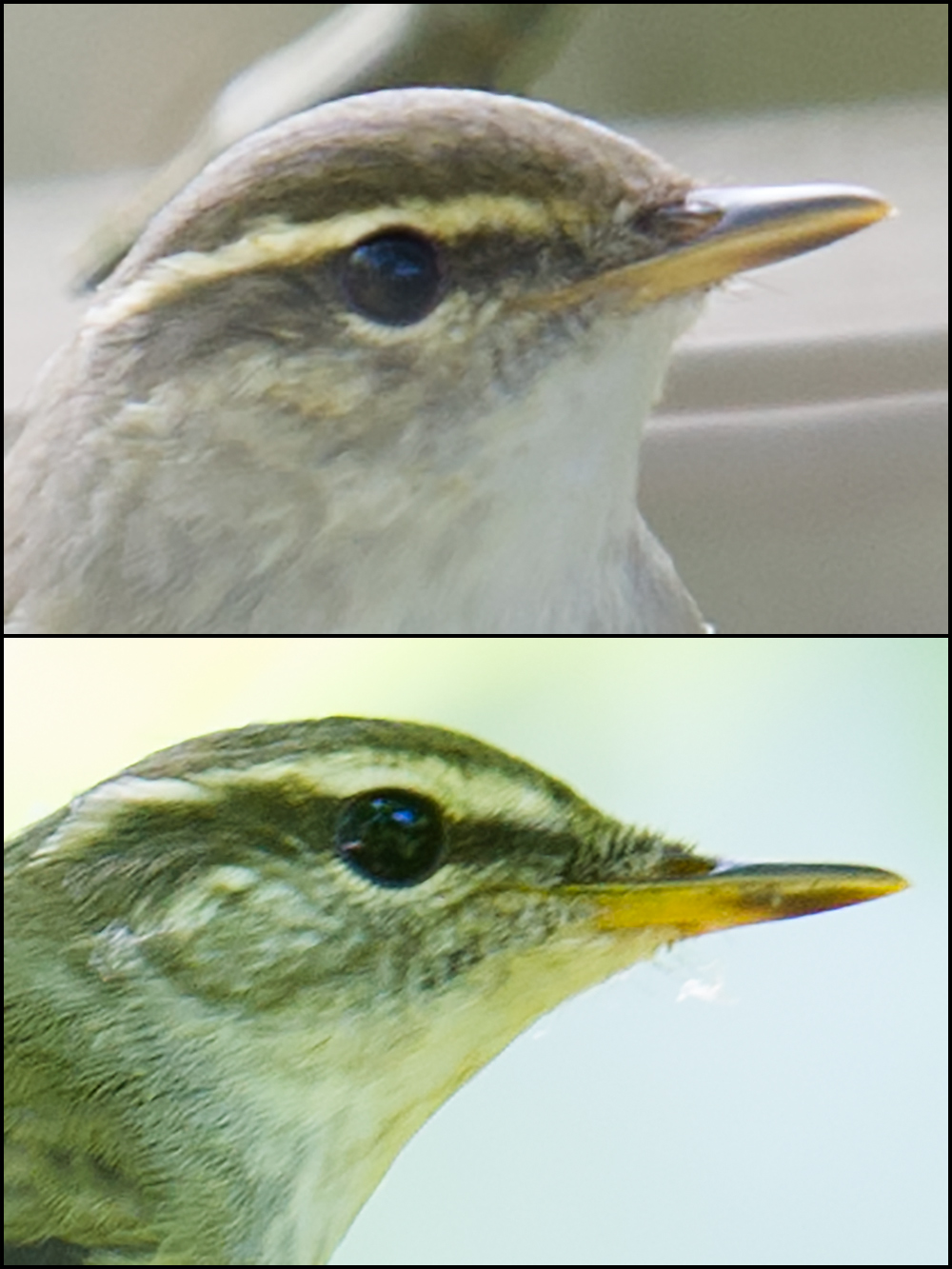
Michael and I heard our loudest song and calls during that first, early morning encounter. However, we heard Kamchatka calling throughout the day.
Our new Shanghai record, combined with late-May and early-June records from nearby Zhejiang, suggests that in this region, once the wave of Arctics passes through around 15 May, Kamchatka Leaf Warbler may be the Arctic-type to look out for.
BIBLIOGRAPHY
Alström P., T. Saitoh, D. Williams, I. Nishiumi, Y. Shigeta, K. Ueda, M. Irestedt, M. Björklund & U. Olsson (2011). The Arctic Warbler Phylloscopus borealis—three anciently separated cryptic species revealed. Ibis 153:395-410. Available at https://www.shanghaibirding.com/wp-content/uploads/2019/04/Alstrom-et-al-2011-Arctic-Warblers-IBIS.pdf (accessed 18 Apr 2025).
Brelsford, C. (2017). eBird Checklist: https://ebird.org/ebird/view/checklist/S37369822. eBird: An online database of bird distribution and abundance [web application]. eBird, Ithaca, New York, USA (accessed 20 Sep 2022).

Brelsford, Craig, moderator. Shanghai Birding, a WeChat group. Discussions with various birders, chief among them Hangzhou birder Cheng Qian, who had information about sightings of P. examinandus in Zhejiang. Beijing-based Swedish birder Jan-Erik Nilsén also provided timely advice. To join Shanghai Birding, in WeChat, friend Craig Brelsford (WeChat ID: craigbrelsford). In your friend request, please make it clear that you wish to join Shanghai Birding.
del Hoyo, J. & Collar, N. (2017). Kamchatka Leaf-warbler (Phylloscopus examinandus). In: del Hoyo, J., Elliott, A., Sargatal, J., Christie, D.A. & de Juana, E. (eds.). Handbook of the Birds of the World Alive. Lynx Edicions, Barcelona, Spain (retrieved from https://doi.org/10.2173/bow.arcwar2.01 on 20 Sep 2022).
Jackett, N. (25 Feb. 2016). First Kamchatka Leaf Warbler recorded for Australian Mainland. eBird Australia: https://ebird.org/content/australia/news/first-recorded-kamchatka-leaf-warbler-for-australian-mainland/. eBird, Ithaca, New York, USA. ebird.org (accessed 20 Sep 2022).
Featured image: Kamchatka Leaf Warbler Phylloscopus examinandus. At Shanghai’s Cape Nanhui, birders Michael Grunwell and Craig Brelsford found the individual pictured here and three others. (Craig Brelsford)

